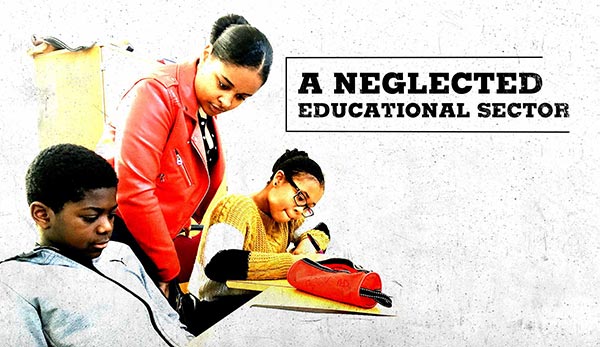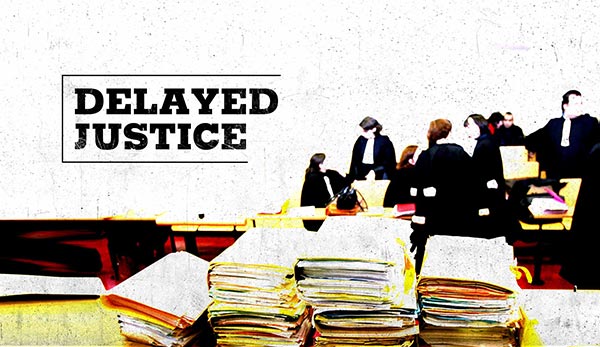"Let's work together for republican equality." The motto emblazoned on the gates of Stains city hall shares space with an unusual version of Marianne. The feminine personification of the French Republic and its "liberté, égalité, fraternité" motto is shown here flexing her biceps. Upstairs, Azzedine Taïbi, mayor of this city of 40,000, is preoccupied. The news has come down that after-school programmes for local primary schoolchildren will be discontinued. Their parents learned as much from the school log book that teachers send home with their children and some have come seeking more information from city officials. Since 2013, the scheme had offered assistance to children in disadvantaged areas (so-called “priority education zones”), including help with their homework or access to sport or cultural activities outside of class hours.
From the city government’s perspective, the loss is an injustice inflicted on local schoolchildren – yet another in a long list.
The students here know all about it. Shehrazade is a high-school senior at the Lycée Maurice Utrillo in Stains. Every Saturday, she drops in at a local organisation called Stains espoir (Stains Hope) for help with her homework. Shehrazade’s day-to-day routine includes school violence, the repeated absences of her teachers and a vice-principal who’s an ex-gendarme. But she doesn't believe it’s like this in other places. "I get the impression people elsewhere learn better," confides the girl in the round glasses, her hair pulled into a bun.
"Typically, every Saturday morning we're supposed to have a test in class," she says. "But that was cancelled. The principal said there weren't enough monitors and that the education ministry didn't have the money to hire more."
‘Whether absent teachers are replaced depends on the degree of protest’
The phenomenon of not replacing teachers who are absent has become a parent's nightmare in Seine-Saint-Denis. Leïla Kerbache, vice-president of a local parents’ union, has run the numbers. Between September 2018 and January 2019, her son, in his first year at the Collège Henri Barbusse (junior high-school) in Saint-Denis, has lost out on 46 hours of class time due to the lack of teachers able to provide those classes.
The absences also affect younger children. In Bobigny, Véronique Decker has the same problem at the primary school she runs. She recalls a time a few years back when one of her classes of 10- and 11-year-olds went without a teacher for a full month.
And yet, as the parliamentary report on state action in Seine-Saint-Denis notes, "Given the difficulties the pupils have, teachers' absences are more detrimental than they would be elsewhere". During a violence-awareness day at her son's school, Kerbache was surprised to hear the students say that their teachers' absences felt like a form of violence, too.
Agnès Van Zanten, a sociologist and member of Sciences Po's Sociological Observatory on Change, says, "It is obvious that students feel a sort of contempt because it is well-known that things don't work like this elsewhere. As soon as you are talking about the most difficult territories, the administration sort of adapts to this kind of context. So we replace absent teachers based on the degree of protest" in response.
An increasing reliance on contract workers
Still, in recent months, the situation in Seine-Saint-Denis’s primary schools has improved. Or at least on the surface. Because, says Decker, "parents are led to believe that there is a substitute because the state sends a contractor". Contract teachers are recruited at the Bachelor's or Master's level, but they haven't passed the teaching exam or taken a two-year initial training course. Some have no teaching experience at all and some come from a different profession altogether.
Primary schools in the Créteil school district, which comprises Seine-Saint-Denis and two other administrative departments east of Paris, account for the highest levels of contract teachers in the country (more than 33 percent of teachers, compared to 21 percent in the Versailles school district, five percent in Toulouse and nine percent in Lyon), a report by France’s Cour des Comptes auditing body showed in March 2018. And within the Créteil school district generally, Seine-Saint-Denis has the highest ratio of contractors relative to its teaching workforce (13.7 % in 2016).
The thing is, when teachers lack training, classes don't always run smoothly. "At best, the children are babysat. At worst, incidents occur between [students and new teachers, the latter of whom] who don’t understand the context and are not equipped to handle the situation," Decker says.
The permanent teaching staff here are indeed fully trained. But the trained teachers working in Seine-Saint-Denis tend to be among the nation’s youngest. The May 2018 parliamentary report showed that nine percent of all of the new teacher-training graduates assigned to mainland France secondary schools at the start of the 2016-17 school year were assigned to schools in Seine-Saint-Denis. But says Decker, who has 30 years of experience in education under her belt, "It takes between five and eight years to become a good teacher".
These inexperienced young teachers also lack support. Seine-Saint-Denis is chronically short on kindergarten teaching assistants, assistants for disabled students, social workers and school doctors. The lack of personnel is partially due to recruitment shortages as well as a shortfall of candidates for positions that are poorly paid, considering the workload and the cost of living in the greater Paris area.
‘In Paris, it feels like you have more support’
Charlotte* taught for more than 20 years in Seine-Saint-Denis. At the start of the 2018 school year, she left the department for a teaching job working in a specialised network for children with learning difficulties that spans several schools in Paris’s 18th arrondissement.
"The first month was a very difficult experience. I realised that there was flagrant injustice [for the schoolchildren of Seine-Saint-Denis]," the teacher recounts. In the working-class Goutte d'Or neighbourhood where she now works, the social problems she sees are similar to the ones some families in Seine-Saint-Denis face. And yet, to Charlotte, everything on this side of the French capital’s périphérique (ring-road) seems easier. "In Paris, there are social workers inside the schools. It's the first time I've seen that. They are paid by the city and there are also ministry of education schemes like the 'R'école' emergency mediation system for students with difficulties."
To her, the lack of public funds for education in Seine-Saint-Denis is most keenly felt in the school sector and whatever else is not working at the department level. "In Paris, it feels like you have more support," she says.
These on-site social workers make life easier at Paris schools. The poorest cities don't have the means to provide so many services. As a result, public school students there suffer, and the French Republic’s promise of schools granting everyone the same start continues to be broken. The State has sought to address inequalities, for instance by proposing to double the number of teachers for the first two grades in certain high-priority primary schools. But some cities in Seine-Saint-Denis just can’t apply that measure. Take Pierrefitte-sur-Seine, where the city would require 35 classrooms in order to put that pledge into effect, whereas it only has 15. "And that's when we have to ‘co-opt’ other, everyday rooms, like local libraries", a City Hall spokesperson explains.
‘Exhausted’ teachers
In secondary schools, which don't benefit from city budgets, another challenge is supervising the students. Jérémy Mounier, who teaches Physics and Chemistry in Pierrefitte-sur-Seine and is a member of the SUD Education union, told FRANCE 24 he is "exhausted" from the daily act of doing his job as a teacher as well as having to adopt the additional functions of a social worker, hall monitor and even janitor for his classroom.
"There is a social worker in my junior high school, but she has to divide her time between several schools. So she is only here two mornings a week, for 700 students. Along with the other students in the area, that gives her far too many cases to manage all on her own," he explains.
According to the sociologist Benjamin Moignard, cited in the parliamentary report, "The worst equipped Parisian school is better equipped that the best equipped school in Seine-Saint-Denis."
Reducing inequality
In light of the urgent need, residents, schools, city governments and parents alike are rallying to action. A number of city halls are offering after-school study periods. In Montreuil, trained public school teachers are being paid out of the city's budget to provide a one-hour, after-school study session at primary schools. Homework-help groups have also been set up in several cities in Seine-Saint-Denis. Stains espoir has been bringing students and volunteers together for 20 years now.
Every Saturday morning, silence reigns at the Stains community centre. On the ground floor, high school students study for their baccalauréat leaving exams at big communal tables. The junior high and primary school kids are upstairs.
Stains espoir volunteers say that part of their mission is to "compensate for inequalities". Kadhafi, Heud, Djak, Naïma and Assane Diouf, the organisation's president, all went to school in Seine-Saint-Denis. Now graduates with degrees and jobs, they all know very well that the students they supervise don't get the same start as other students. "When you get to uni, you become aware of everything you didn’t have access to," says Assane.
Shehrazade, the Maurice Utrillo high schooler, says that the Stains espoir group provided her with invaluable help. "This year, we didn't have an English teacher until November and we have the leaving exams at the end of the school year. I told the volunteers that I was worried and they helped me a lot," she says.
For the high school students taking advantage of the support on offer, here of all places, passing the all-important baccalauréat and choosing a career are critical. The anxiety of underachieving at school and the urge to prove the statistics wrong blend together in the minds of these teens preparing for that fateful national exam. Shehrazade, for her part, already knows what she wants to do when she graduates: study to become a Special Education teacher.
* Her name has been changed


